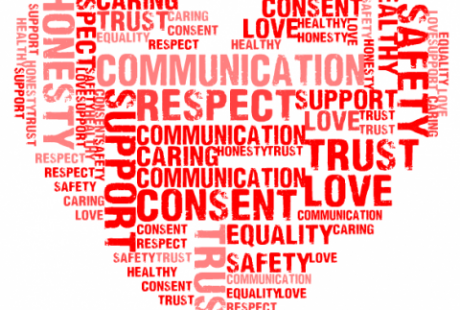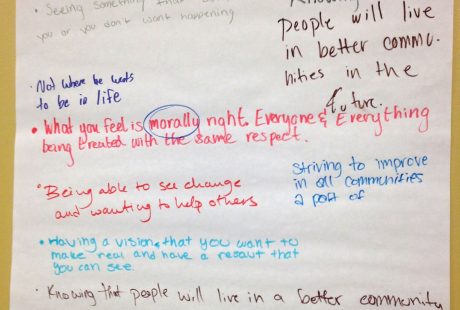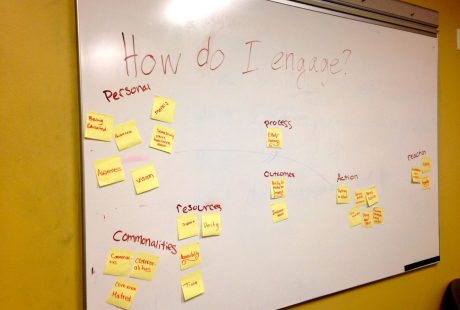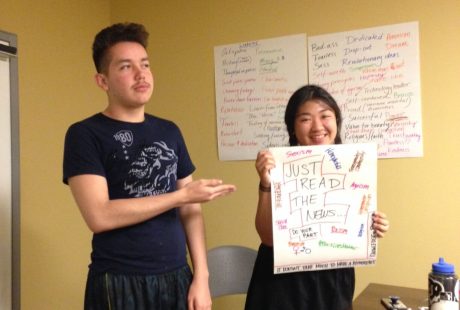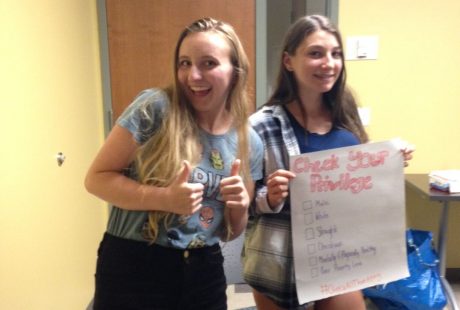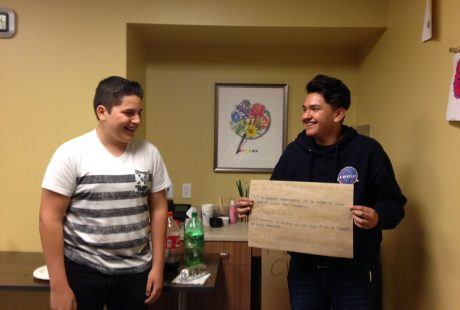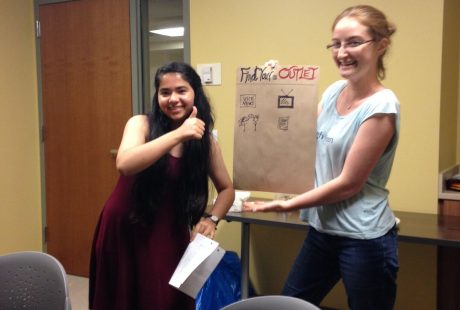Almost a month ago, on February 14th 2018, a day dedicated to love and friendship, another mass shooting occurred in the United States of America.
But this time, it has been different. Young people — high school students to be more precise, have been at the forefront of this #NeverAgain movement. They have started a movement that has inspired and captivated the minds of millions across the country.
They want change and they want it now. Thoughts and prayers are simply not enough when it comes to gun violence. The time for change is undoubtedly overdue.
We asked a couple of questions to our young people from our after school program: Peers Building Justice (PBJ), regarding gun violence, and here is what they had to say about it:
Maddy, 16 years old
1) Do you feel inspired/hopeful by the movement the Parkland survivors have started regarding gun control? Why or why not?
I am absolutely inspired by the movement of the Parkland survivors regarding gun control. It’s really incredible to see young people not just speaking up, but also genuinely being heard by adults both in the community and in those in political office across the country. Teens are constantly pointing out the issues in our society and working to fix them, but often have to work twice as hard to even simply be acknowledged, so I think this shows progress in many different areas of our community. However, even still, I thinks it’s important that we remember that teens and young people of color have been speaking out against gun violence in their communities for a very long time, and have not gotten the kind of attention the Parkland survivors are receiving now. There is something to be said about the fact that this is growing out of a very affluent, white community in our country and that cannot be forgotten. With this in mind, though, the teens who have worked to start this movement inspire me more every day to speak up and use my voice, especially as a young white person in a similarly affluent and white community, to advocate for gun control along with other issues I care about and be an ally to those who don’t have as loud of a voice as I do.
2) What are your thoughts/feelings when going to school every day? Do you feel safe? Why or why not?
As a general rule, no I don’t feel particularly safe when going to school every day, knowing that guns are so easily accessible and schools are such easy and common targets. Yet, even still, physical safety in school is not something that is constantly on my mind, which is mostly due to the immense amount of privilege I have. However, part of this is also due to our desensitization, as a society, to gun violence. It occurs so regularly that, even as fears have risen, so has our tolerance for it. An act of gun violence is something that could almost pass easily over my mind nowadays. Because of this, except for in special circumstances, I generally think little of shootings occurring at my own school. While this may be good, as it would be extremely detrimental to my mental health were I to think about it all the time, it’s also problematic. I, and all of us, have to be thinking of these things because they need to be addressed. This should not be something that any student should have to have on their mind when they enter their school.
3) Do you believe your school, community, and/or local politicians are doing what is needed to address the gun violence and pass tighter gun legislature?
Generally, no, I don’t believe any institutions or generally us as a community, are doing enough to end gun violence and pass tighter gun legislation. When the Parkland shooting happened, I genuinely heard nothing about it all day. None of my teachers or administration said anything regarding it. I understand it’s scary to talk about these things, especially being students and teachers. Students and teachers are two groups who spend most of our days in school, and are obviously common targets, but any change has to start with talk. Luckily, conversation is happening at a larger level, as we can see with the Parkland survivors, however, it is obviously too late. It seems that every time we talk, every time we push for change, every time politicians start agreeing to pay attention to this issue, it’s already too late. We have to be making this change, passing stricter gun legislation, now, before we stop talking and another shooting occurs. It seems we are on the right track right now at least, as we have gotten momentum from the Parkland survivors, but this has to continue. All of us, and especially those with power in schools, and particularly politics, have a duty to prevent future mass shootings. Thoughts and prayers after the fact aren’t enough anymore.
Enrique, 15 years old
1) Do you feel inspired/hopeful by the movement the Parkland survivors have started regarding gun control? Why or why not?
I feel very inspired by the Parkland students. They have started a very important movement that should change a lot of people’s lives in a positive way. Also, a lot of people think since we’re students and that we are so young, that we don’t know what we’re talking about, but, these Parkland students are an example of the large impact we have to the community as students. These students suffered a very painful event that could have possibly been avoided by stronger gun control. The discussion over gun control has always been pushed to the side, and it’s something that shouldn’t be ignored. School shootings have been occurring a lot since the start of this year. The proposed solution is implementing new gun control legislation. That’s what the Parkland students and all students want to see, a resolution to the amount of school shootings.
2) What are your thoughts/feelings when going to school every day? Do you feel safe? Why or why not?
I am very thankful that most of the days that I go to school, I can feel safe. But, some students don’t feel safe at their school, even though schools should be a safe zone for students. Also, there are a lot of issues with schools being threatened. For example, one day that I didn’t feel safe at school was when there was a shooting threat. Even my parents were doubtful if they should’ve sent me and my older brother to school that day, but when I arrived at school I realized that most students didn’t show up. It was such a big deal that it even seemed like the teachers were scared. For example, my 1st period teacher decided to address what the situation was and why so many students were missing. Also, he even thought it was necessary to explain to us what our emergency escape options were because everyone was very paranoid. Nobody should have to be scared to come to school, we should all feel safe in our learning environments.
3) Do you believe the National School Walkouts and the March for Our Lives rallies will impact/will lead to change? Why or why not?
I do believe that the National School Walkouts and the March for Our Live rallies will lead to change because they’re strong events that can send a message to the government. If the government truly cares about public opinion, they will see the amount of support shown in our movement and will propose a solution. Also, all these movements will impact the consideration for new legislation because all these protests will get a lot of attention bringing in more support from others. Although, this movement will need a lot of contribution with a lot of hard work, I believe we are a strong community of students that can come together to raise our voice over something we support.
Tatai, 17 years old
1) Do you feel inspired/hopeful by the movement the Parkland survivors have started regarding gun control? Why or why not?
I feel extremely inspired and hopeful by the Never Again movement that the Parkland survivors have started. I find it motivating to see how a few high school students have started a nationwide movement that has created change even in our current political climate. The Parkland survivors have inspired me significantly. I am very impressed by how they were able to take social media and use it as an outlet to create a non-partisan movement demanding to enforce gun control policy. I have a lot of confidence in my generation with all of the political action and participation I have seen and will continue to see. This movement is also very important in revolutionizing the way that politicians see students, making them recognize teen activists as political leaders that need to be taken seriously.
2) What are your thoughts/feelings when going to school every day? Do you feel safe why or why not?
While attending a predominantly wealthy and white high school in Boulder, and while being white and living in Boulder, I usually feel pretty safe on a day to day basis. Two years ago on Facebook someone posted a bomb threat towards Boulder High, and the next day absences were not marked but school was still in session. It was soon found out to be someone who was angry over the basketball rivalry and blowing off steam. I quickly realized that many students had become so numb to this trend of violence that it has become a common part of some peoples humor, this school year (2017-2018) at least two people have been suspended for posting ‘jokes’ about gun violence on school property. I have only lived in Boulder for three years and have experienced other times during my education when I haven’t felt or been safe at school, my safety’s came into question as a result of fights, being bullied, people bringing weapons to school, and other physical threats.
3) Do you believe the National School Walkouts and the March for Our Lives rallies will impact/will lead to change? Why or why not?
I do believe that the National School Walkouts and the March for Our Lives rallies can lead to change. All fifty states will be having marches on the 24th of March, and I really hope that the amount of students that will be marching will be enough to convince our government that they need to protect us and not their guns. The March for Our Lives is led by the Parkland survivors, I believe that the political action that they have created in my generation will continue to lead to change even past gun control. This nationwide movement is going to make a lasting impact, and I am ready to make history.
Our PBJ youth, along with other young people, teachers, and many other individuals, will be participating in the National School Walkouts and the March for Our Lives rallies here in Boulder and Denver, Colorado.
~~~~~~~~~~~~~~~~~~~~~~~~~~~~~~~~~~~~~~~~~~~~~~~~~~~~~~~~~~~~~~~~~~~~~~~~~
We encourage every BVSD high school to participate in both National School Walkouts. The first walkout will be on March 14, 2018 for 17 minutes (one minute for every individual lost in the Parkland shooting), and the second will be an all-day walkout on April 20th, 2018 to commemorate the anniversary of the Columbine shooting in 1999.
The March for Our Lives will take place on March 24, 2018 at the Denver’s Civic Center Park from 2-5pm.
We encourage everyone to come out and join this very important movement.
